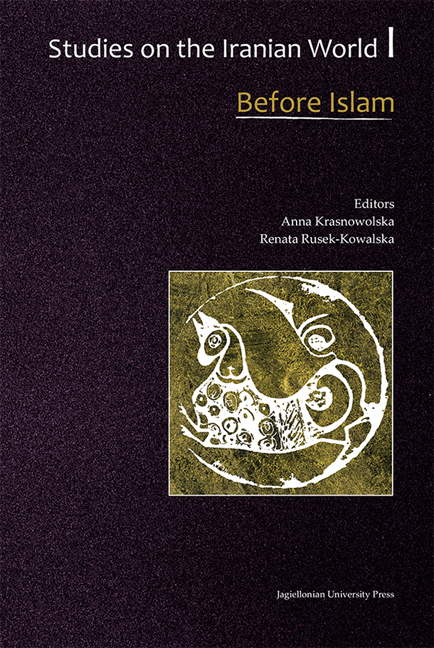Book contents
- Frontmatter
- Contents
- Foreword
- Linguistics
- The Old Persian Genitive. A Study of a Syncretic Case
- Nominal Compound Strategies in Middle Iranian Languages
- Alan Place-names in Western Europe
- Work in Progress: The Catalogue of the Buddhist Sogdian Fragments of the Berlin Turfan Collection
- Preliminary Remarks on Middle Persian ‹nc› in the Pahlavi Documents
- Literature
- Religion
- History
- Archaeology
Work in Progress: The Catalogue of the Buddhist Sogdian Fragments of the Berlin Turfan Collection
from Linguistics
Published online by Cambridge University Press: 12 January 2018
- Frontmatter
- Contents
- Foreword
- Linguistics
- The Old Persian Genitive. A Study of a Syncretic Case
- Nominal Compound Strategies in Middle Iranian Languages
- Alan Place-names in Western Europe
- Work in Progress: The Catalogue of the Buddhist Sogdian Fragments of the Berlin Turfan Collection
- Preliminary Remarks on Middle Persian ‹nc› in the Pahlavi Documents
- Literature
- Religion
- History
- Archaeology
Summary
SUMMARY
Three fragments of the Buddhist Sogdian part of the Berlin Turfan collection preserve a commentary or explanation of a Vinaya-text, identified by Yoshida Yutaka. The keywords allow the conclusion that these three fragments originate from successive pages and contain the §§ 19–24 of the Vinaya-text about the 90 Pātayantika-Dharma. One part mentions two as yet unknown words. 1. krpyc is well attested in Old Turkic and in Russian. We hope to explain it as a word of Sogdian origin. 2. ‘rs’ could be an Arabic word. But the meaning remains uncertain.
The work on the catalogue of the Buddhist Sogdian manuscripts of the Berlin Turfan collection continues to advance. There are approximately 500 Buddhist Sogdian fragments. Most of them are very badly damaged; an identification is therefore very difficult. Here an example of my recent work shall be presented.
The three fragments, So 10921, So 19530a and So 19530b are written in the same hand and have a similar form. For the photographs see: http://www. bbaw.de/forschung/turfanforschung/dta/so/dta_so_index.htm.
For many years, only two fragments were known: So 10921 and So 19530. In 1999 Yoshida Yutaka investigated the Buddhist Sogdian fragments in the Berlin Turfan collection and discovered that two fragments of the same form actually were put under the same glass one on the top of the other. The fragments were separated by the restoration department of the Berlin State Library. A caption became visible. Helped by this caption Yoshida Yutaka was able to identify the text as part of a Vinayavibhaṅga. These are texts with explanations of monastic rules. He found the matching passage in the 32nd book of the Mūlasarvāstivāda-vinaya-vibhaṅga, T.T. 1442, vol. 23, 803c. The Sogdian text does not agree with the Chinese text in detail, but keywords are corresponding. For example So 19530a contains the end of the § 21 and the beginning of § 22 of the Vinaya text as published by Yoshida Yutaka.
The paragraphs referred to belong to the 90 Pātayantika Dharmas of the Prātimokṣa of the Sarvāstivāda (Sv.) as they are preserved in several languages.
These are the paragraphs in question
‘Sv. V. 19: Whatsoever Bhikṣu knowing there are creatures in the water shall sprinkle it on grass or on clay or shall cause other to do the same – that is a Pātayantika.’
- Type
- Chapter
- Information
- Studies on the Iranian World: Before IslamMedieval and Modern, pp. 59 - 66Publisher: Jagiellonian University PressPrint publication year: 2015



